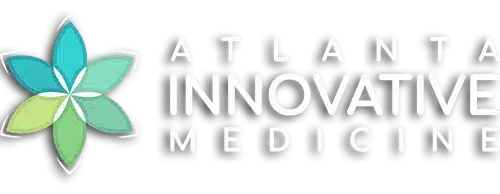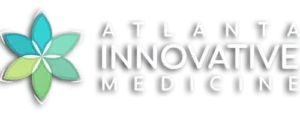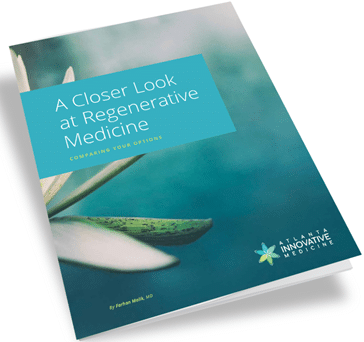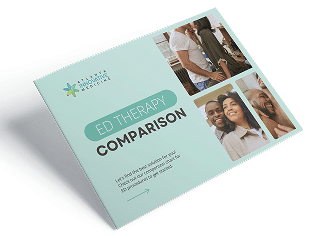By Farhan Malik, MD
Atlanta Innovative Medicine
If you are suffering from osteoarthritis (OA), you are not alone. OA is one of the most common forms of arthritis, affecting 23% of the adult population. Those who experience the pain it causes know and understand how difficult it can be to manage.
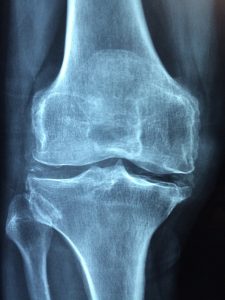
Current Treatment Options
There is presently no cure for OA and it can be challenging to treat. Safe, effective and nonsurgical treatment methods are needed, but most options only temporarily relieve pain.
Today’s current OA treatment focuses on ways to manage symptoms and slow down the degenerative process, typically involving activity modification to help relieve pain and stiffness, and buying time before an entire joint replacement. While joint replacements can be effective in treating late stages of OA, it is not suitable for earlier and moderate stages. And surgery is also not 100% effective, with many patients experiencing chronic pain after the operation and recovery period.
Additional Treatments Include:
- Elevation and Icing
- Exercise
- Weight Loss
- Physical Therapy
- Topical Anti-Inflammatory Gels
- Oral Non-Steroid Anti-Inflammatory Drugs (NSAIDs)
- Injection Therapies (including steroids such as Cortisone)
Limitations of Exercise, NSAIDs, and Injection Therapies
While they are often effective, the continued use of Non-Steroid Anti-Inflammatory Drugs (NSAID) can potentially lead to severe side effects that limit their usefulness. This makes NSAIDs a poor option for long-term treatment plans. Though it is a common treatment approach, cortisone shots and physical therapy don’t always help, or may lose their effectiveness over time.
Exercise has arguably been one of the first treatments encouraged for those with OA, this can be hard to follow up with, especially if the patient is experiencing pain. One study shows that OA patients with a treatment plan of a PRP injection with an exercise program reported less pain than those that did not receive a PRP injection and only relied on exercise.
Based on the published science and our extensive clinical experience at Atlanta Innovative Medicine, PRP injections can greatly improve the efficacy of exercise and aid in recovery.
Why Consider PRP for Knee Osteoarthritis?
Today many health care professionals are recommending platelet-rich plasma (PRP) as a highly effective treatment option. So what exactly is PRP?
PRP is a growing practice of regenerative medicine. Simply put, it is an injection made up of a concentration of the patient’s own plasma, collected from a small blood sample. This concentrated plasma product contains nearly nine times the concentration of platelets of one’s normal blood.
See if PRP could help your pain.

Regenerative Medicine.
Reimagined
- Advanced hybrid therapies, including Mesenchymal Stem Cell therapy combined with different mechanisms of action that synergistically come together to support ultimate healing
- More powerful PRP that’s customized, amplified and personalized
- Therapies delivered by an experienced, compassionate team comprised of multidisciplinary experts in traditional and alternative medicine working as your team: Medical Doctors, Nurse Practitioners, Physiotherapists and Chiropractors
- Advanced training through the American Academy of Orthopedic Medicine, the American Osteopathic Association of Prolotherapy Regenerative Medicine, and more
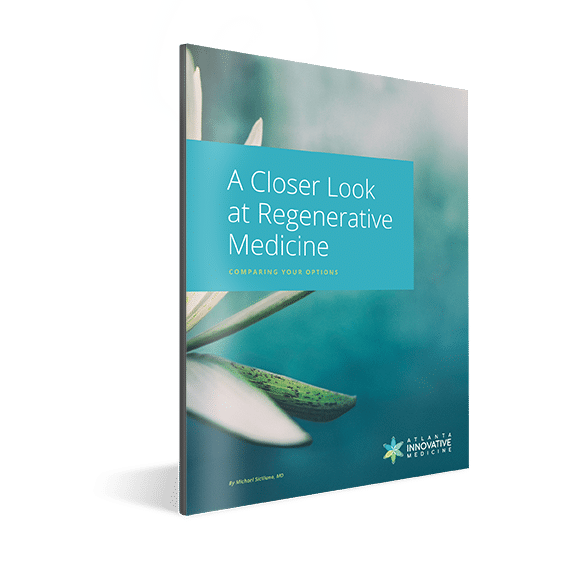
Subscribe for Expert Insights and Our Ebook
A Closer Look at Regenerative Medicine: Comparing Your Options Learn about treatment options like Platelet Rich Plasma (PRP), Prolozone Therapy, and Stem Cell Therapy.
Platelets play an essential role in:
- Maintaining tissue
- Regulating inflammation
- Healing the body
When platelets are activated through injection, their regenerative properties are able to impact a specific, localized area of the body.
The good news is this process is quick and the results can be felt after nearly one week of treatment.
Call us today at 770.416.9995 or use this form to schedule a free consultation to see if you are a good candidate for PRP.
PRP Compared to Other Treatment Options
It can be overwhelming to compare PRP to other treatment options. Generally speaking, PRP comes out on top when compared to NSAID and other treatment options. Unlike NSAID, PRP injections often result in better long-term results, and they can delay disease progression. This is a great improvement from steroid injections, which research now suggests may not only fail to help patients but actually hasten cartilage loss.
While it doesn’t regrow new cartilage, research shows PRP might delay its loss. This could help patients to avoid invasive surgeries like knee replacements. These procedures are more invasive than PRP, which involves a simple blood draw in an office setting using a local anesthetic.
With PRP the patient is both the donor and the recipient, which enhances safety. Though there are still tests that can be done, the growing body of research shows that PRP injections offer a remarkable and safe consideration in the treatment of OA.
Call us today at 770.416.9995 or use this form to schedule a free consultation to see if you are a good candidate for PRP.
References:
- The Washington Post, November 2021, Accessed 12/16/21, Link:
https://www.washingtonpost.com/health/knee-pain-treatment-prp-avoid-surgery/2021/11/05/d13eb3f0-3b22-11ec-a493-51b0252dea0c_story.html
- Clinical Update: Why PRP Should Be Your First Choice for Injection, Therapy in Treating Osteoarthritis of the Knee, Current Reviews in Musculoskeletal Medicine (2018) 11:583–592
https://doi.org/10.1007/s12178-018-9524-x
Quizzes
Are you a candidate for Regenerative Medicine?
Regenerative medicine can be an effective therapy and treatment option for lasting pain relief for a variety of conditions like osteoarthritis of the knee, hip or shoulder; ACL or meniscus tears; tennis or golfer’s elbow; chronic neck and back pain; and more.
Is it right for you and your condition? Take 1 minute to answer a few “yes or no” questions that help to assess if you might be a candidate for PRP, stem cell or other nonsurgical regenerative treatments.
Are You a Stem Cell Candidate for Your Joint or Spine Damage?
Are you a candidate for Platelet Rich Plasma (PRP) Therapy?
Do I have nonsurgical options for my injured or aging joints?
Take the Pain Medications Risk Quiz
All content of this page is for informational purposes only and is not intended to serve as a substitute for the consultation, diagnosis, and/or medical treatment of a qualified physician or healthcare provider. Individual results may vary. Your medical professional can explain all the risks and potential benefits of any therapy based on your specific circumstances. At this time regenerative therapies are not FDA approved. Neither Atlanta Innovative Medicine nor its physician affiliates promise regenerative therapies as a cure for any condition, disease, or injury.
Other Atlanta Areas We Service:
© 2024 Atlanta Innovative Medicine, LLC. All Rights Reserved. AIM Scholarship Opportunity
